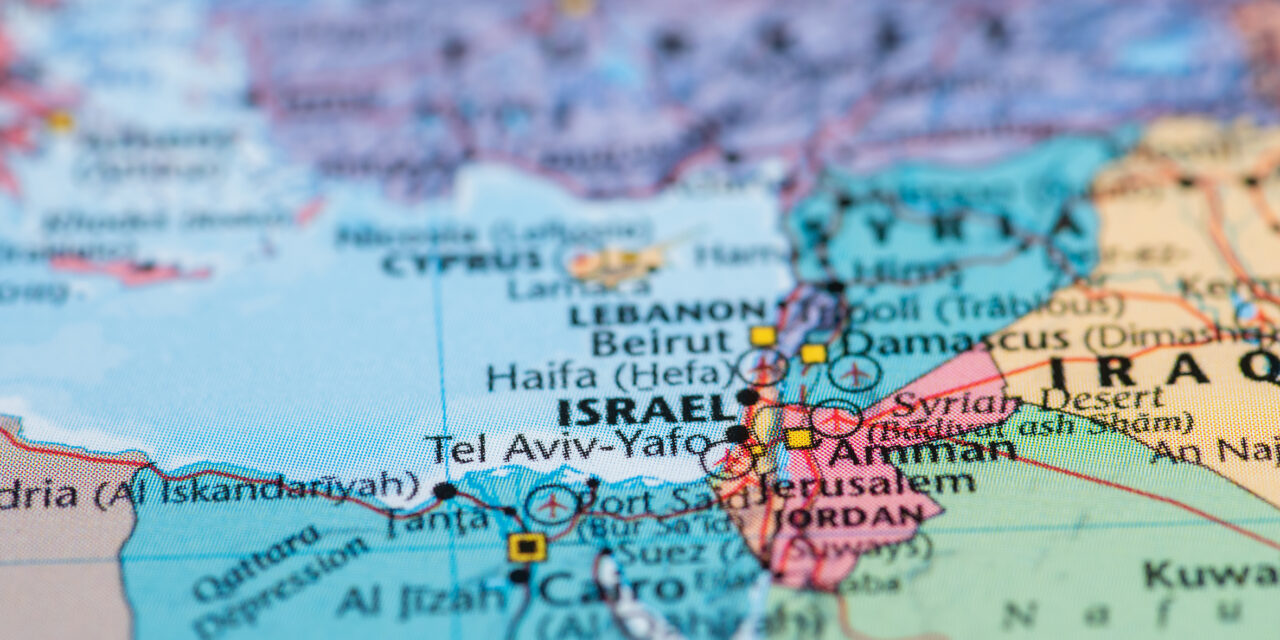Unless Israel establishes an endgame strategy that will lead to a two-state solution to the Israeli-Palestinian conflict, the war against Hamas will only be another brutal violent episode that will prepare the ground for the next conflagration engulfing the West Bank and potentially set the entire region on fire
Israel-Hamas War Affirms The Indispensability Of A Two-State Solution
Whereas Israel’s stated goal from the onset of its war in Gaza was and still justifiably is the destruction of Hamas, Israel has not offered as yet any clear exit strategy. Even though Hamas cannot be defeated completely, Israel, with the support of the US and Saudi Arabia in particular, will have to offer a sound alternative that meets the Palestinians’ aspirations and renders Hamas irrelevant. President Biden should demand that Prime Minister Netanyahu and his military brass develop, in coordination with the US, a clear exit strategy and an endgame consistent with Israel’s right to exist with peace and security, and the Palestinians’ right to establish a state of their own.
Although there are several options that have been discussed, including the permanent reoccupation of Gaza by Israel, the resettlement of the Palestinians from Gaza in Egypt, allowing the Palestinians to establish a civilian authority while Israel maintains overall security in Gaza, or militarily occupying part or all of Gaza, I maintain that none of the above are viable because the eventual establishment of a Palestinian state is central to any sustainable resolution. The Biden administration must insist that Israel agree to this outcome through a negotiating process sponsored by the US and Egypt, Jordan, and Saudi Arabia—the three Arab states that are directly affected by such an outcome and also exert the greatest influence on the Palestinians.
The exit strategy that must end the Israeli-Palestinian conflict
Given the 75-year history of the Israeli-Palestinian conflict, which has been marked by several wars, major violent encounters, and massive losses of lives and destruction that have now culminated in the most horrifying war between Israel and Hamas, it is time to push for a permanent end to the conflict. The US and the Arab states must bring every pressure to bear on Israel and the Palestinians to end the conflict based on a two-state solution.
Needless to say, the negotiations will be extremely difficult and complex and may well take a year or even more to conclude; nevertheless, there is simply no other viable option. The only alternative is continuing the bloody conflict for decades to come, after which nothing will fundamentally change. Israel will continue to exist but live by the gun, as will the Palestinians with their aspiration for statehood, which remains sine qua non to peaceful co-existence.
Transitional period
For Israel and the Palestinians to reach a sustainable peace agreement, it is necessary to establish a transitional period whereby the United Nations would assume responsibility in Gaza. Administratively, the UNSC should pass a resolution requiring a transitional authority composed of Arab civilian leaders and Palestinian experts in various fields, known for their balanced views and commitment to a peaceful resolution to the Israeli-Palestinian conflict.
If the UNSC fails to pass such a resolution, the Arab League can do so instead. In addition, UNWRA, which has been on the ground for decades, providing aid and development services, including education, healthcare, microfinance, and job training, is in the best possible position to assume greater responsibility, provided that it will be strictly monitored under a modified and expanded mandate.
As Israel begins to withdraw its forces from Gaza gradually, it will be necessary to establish a peacekeeping force to be in charge of security. This force ought to be comprised exclusively of the Arab states that are at peace with Israel, especially Saudi Arabia, Egypt, Jordan, the United Arab Emirates, and Morocco. This force must ensure that other than internal security forces, Gaza is demilitarized and remains so under a newly-elected Palestinian Authority.
The Arab states should condition their commitment to provide a peacekeeping force upon Israel’s acceptance of a two-state solution, and in fact, in recent conversations with several Arab officials, I was told in no uncertain terms that their countries will not agree to form such a peacekeeping force unless it has been agreed upon in advance by Israel. In addition, they want an ironclad commitment from the US to take whatever steps necessary to pressure Israel to agree to the establishment of a Palestinian state to live in peace with Israel.
The concern that such a peacekeeping force composed of Arab militaries may have about fighting against residual Hamas militants—Muslim and Palestinian—can be addressed only under this mandate. That is, the peacekeeping force can thus justify fighting back against such resistance because it is critical to preserving any agreement reached to establish a Palestinian state.
In terms of Arab financial support, here again, in my conversations with Arab officials, they emphasize that under no circumstances would they contribute to rebuilding Gaza and invest in institutions and infrastructure in the West Bank unless two preconditions are met.
First, both the Israelis and the Palestinians must agree that they will enter into a negotiation process with the aim of establishing a Palestinian state because they are adamant on not investing billions in reconstruction only to see it destroyed again. Second, it must be guaranteed that any interim solution be used only as a vehicle toward a final resolution. Otherwise, it would serve as nothing less than a respite before another disaster unfolds.
A newly-elected Palestinian Authority for both the West Bank and Gaza
It should be made clear that post-Hamas, the West Bank and Gaza will be governed by the Palestinian Authority. This, however, should not happen for at least 18 months following the establishment of a UN administrative authority in Gaza. During this period, the Palestinians in both the West Bank and Gaza would prepare for a new election. The current Palestinian Authority (PA) is corrupt; President Abbas is rejected and despised by the majority of Palestinians and must go. Only a newly-elected leader who enjoys the people’s confidence can succeed.
A recent poll among Palestinians both in Gaza and the West Bank, completed on October 6, shows that 74 percent do not trust either Hamas or the Palestinian Authority (67 percent of Gazans said they had “not a lot” or no trust at all in Hamas’ governance; 81 percent of Palestinians in the West Bank did not express trust in the Fatah-led government). Both parts of the Palestinian territories have and continue to suffer from corruption, human rights violations, misappropriation of finances, rampant joblessness, and hopelessness. They would welcome a change in the governing authority.
On the Israeli side, no one should hold their breath waiting for Netanyahu and his gang of zealous coalition partners to agree on anything that even resembles an independent Palestinian state. Once the war ends, Netanyahu will face an inquiry about the unfathomable savage butchery of 1,200 Israelis by Hamas that took place under his watch. He will have to resign or be ousted. Here too, a new government will have to be established in Israel, which must commit itself from the onset to a two-state solution. Once the two prerequisites are in place, the UN administrative authority will relinquish its role and responsibility to the PA.
The role of the US and Saudi Arabia
Saudi Arabia and the US can play a major, in fact indispensable, role in this regard:
The US has been and continues to be the ultimate guarantor of Israel’s national security. President Biden has done more than any of his predecessors in this regard and demonstrated that in the most unambiguous way by his unflagging support of Israel. He must make it very clear (and is in a position to do so) to Netanyahu or his successor that the US’ unwavering support bears considerable political cost to America domestically and internationally. Many countries around the world view the US as complicit in the unfolding horror in Gaza. President Biden must advance a framework for a two-state solution, which he has advocated for many decades, consistent with the above proposal.
The negotiating process will undoubtedly take more than a year to complete. Since 2024 is an election year, President Biden may choose not to pressure Israel, fearing that the Republicans would use that against him. Given, however, this historic opportunity, which could lead to a permanent solution to the Israeli-Palestinian conflict, President Biden cannot afford to miss such an opening, and he may well succeed where his predecessors failed. It’s time for the US to stop giving Israel carte blanche to do as it pleases, demand accountability, and ensure both sides negotiate in good faith to reach a peace agreement.
Saudi Arabia can complement the US initiative with its own most significant role by seizing on the breakdown in Israeli-Palestinian relations and offering an unprecedented breakthrough to bring an end to the conflict. The Saudis should make it clear that once the war ends, they will be ready to normalize relations with Israel on the condition that a new Israeli government agree to a two-state solution and negotiate continuously until an agreement is reached.
This war must end, leaving Hamas dramatically weakened and in disarray. But Hamas’ ultimate defeat will not be on the battlefield; it will be by creating an alternative to Hamas’ governance from which the Palestinians will significantly benefit. That contrast ought to be made clearly and immediately to demonstrate to the Palestinians that Hamas was not only the enemy of Israel but the enemy of ordinary Palestinians. Yes, all Palestinians in Gaza want to live in peace and prosper but they were deprived of living a normal life because of Hamas’ violent resistance to Israel, squandering every resource to fight Israel while leaving the people despairing and hopeless.
Israel should not prolong this tragic war by even one unnecessary day. Indeed, if this war lasts another month or two, it is almost certain that 20,000 to 30,000 Palestinians, mostly innocent women and children, and scores of Israeli soldiers will be killed. This will only deepen the hatred, enmity, and distrust between Israel and the Palestinians and make a solution to the conflict ever more intractable.
Yes, Israel can and will win tactically every battle against Hamas. Still, it will strategically lose the war unless a peace process between Israel and the Palestinians begins now, even before the war comes to an end. Ironically, the horrifying Israel-Hamas war may well have made it possible.
—
For more information on how a sustainable peace agreement based on a two-state solution can be reached, please refer to my essay in World Affairs, “The Case for an Israeli-Palestinian-Jordanian Confederation: Why Now and How?”
____________
Dr. Alon Ben-Meir is a professor of international relations at the Center for
Global Affairs at NYU. He teaches courses on international negotiation and
Middle Eastern studies.
For media inquiries, contact Kim Hurley at 212.600.4267 or at kimberlee@alonben-meir.com.
Please feel free to share this article with your contacts.



















